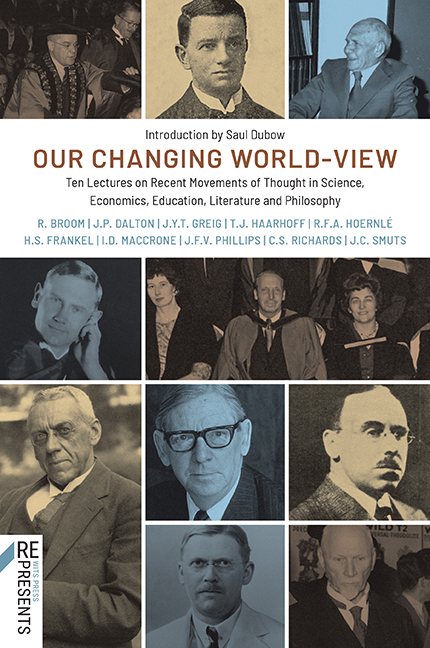 Our Changing World-View
Our Changing World-View Book contents
- Frontmatter
- Contents
- Introduction
- Preface
- Miscellaneous Frontmatter
- 1 Some Recent Scientific Advances in Their Bearing on Philosophy
- 2 The Material World—Yesterday and Today
- 3 Evolution—Design or Accident?
- 4 Man at the Crossroads
- 5 Psychology in Perspective
- 6 Literature in the Machine Age
- 7 The Holistic Attitude in Education
- 8 Our Changing Economic World
- 9 Africa in the Re-Making
- 10 Old Truths and New Discoveries
10 - Old Truths and New Discoveries
Published online by Cambridge University Press: 12 October 2021
- Frontmatter
- Contents
- Introduction
- Preface
- Miscellaneous Frontmatter
- 1 Some Recent Scientific Advances in Their Bearing on Philosophy
- 2 The Material World—Yesterday and Today
- 3 Evolution—Design or Accident?
- 4 Man at the Crossroads
- 5 Psychology in Perspective
- 6 Literature in the Machine Age
- 7 The Holistic Attitude in Education
- 8 Our Changing Economic World
- 9 Africa in the Re-Making
- 10 Old Truths and New Discoveries
Summary
To speak on behalf of Philosophy to a modern audience is not easy. The man in the street often wonders what philosophy is about. The man of science generally is quite sure that it is about nothing. The easiest way of evoking a laugh from either is to repeat, as was done during this course of lectures by one of the proposers of a vote of thanks, the ancient tag that a philosopher is like a blind man in a dark room seeking for a black cat that is not there.
No wonder that my feelings are a little like those recently expressed by my old friend and former colleague at Harvard, Professor R. B. Perry, in his witty Defence of Philosophy: “There are many drawbacks to being a professor of philosophy, and one of the worst is that you cannot gossip lightly about your occupation. Picture yourself in that great American forum and social centre, the smoking compartment of a Pullman car. There has been an exchange of confidences about the boot and shoe industry in St. Louis, or the boot-legging industry in Detroit, when your neighbour turns to you and asks, amid a hush of expectancy, what you sell. To be as candid and optimistic as your neighbours, you would be compelled to say: ‘My firm manufactures and distributes ultimate truth; our business is to discover the nature of the Universe, and apply it to the meaning of life.’ Some sound instinct prevents you from saying it. You know that you would create a situation which neither you nor your neighbours would be able to support, much as though you were to say: ‘I am God.’ So you hastily mumble something about being a teacher, hoping they won't insist on knowing the subject you teach—and then pass rapidly on to safer subjects, such as the hard winter we’ve been having or how late the train is.”
I was tempted to ease the difficulty for myself by dealing with some special problem, such as the familiar question, again discussed by Sir Alfred Ewing before the British Association, whether we have developed the minds necessary to control the material civilization which we have created; or the present moral crisis, even graver than the economic one, in which humanity flounders.
- Type
- Chapter
- Information
- Our Changing World-ViewTen Lectures on Recent Movements of Thought in Science, Economics, Education, Literature and Philosophy, pp. 223 - 248Publisher: Wits University PressPrint publication year: 2021
